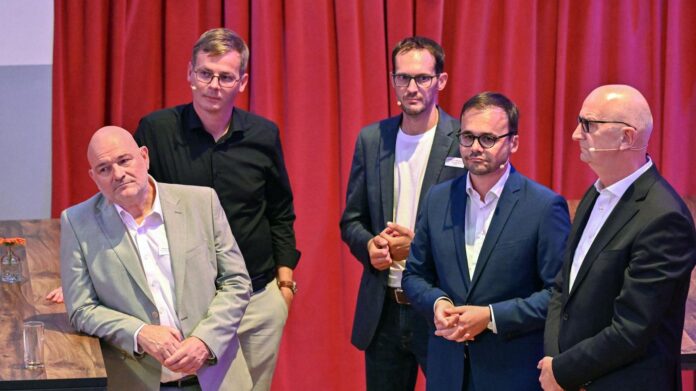
Almost two weeks before the state election in Brandenburg, the AfD has gained in a survey and remains ahead in the voters’ favor with 27 percent – ahead of the SPD with 23 percent. The Social Democrats have also improved significantly, but are unable to reduce their lead as the second-placed party. This is according to the current “Brandenburg Trend” by the opinion research institute Infratest dimap on behalf of the ARD political magazine “Kontraste” from RBB.
The Brandenburg Office for the Protection of the Constitution classifies the AfD as a suspected right-wing extremist case, and top candidate Hans-Christoph Berndt as right-wing extremist. A new state parliament will be elected on September 22nd. A total of 1,207 eligible voters in Brandenburg were surveyed for the representative RBB survey on September 3rd and 4th. It is the first survey since the state elections in Saxony and Thuringia.
AfD and SPD distance themselves from other parties
If there were a state election next Sunday, the AfD would receive 27 percent according to the survey. Compared to the July survey by Infratest dimap, the party gained four percentage points – like the SPD, which came in at 23 percent, contrary to the national trend.
Dietmar Woidke is the Social Democrat’s Prime Minister in Brandenburg. The SPD has governed the state since 1990 with changing partners, and since 2019 with the CDU and the Greens. For Woidke, it’s all or nothing: if the SPD does not win the election, he wants to say goodbye to state politics.
The new survey shows that the AfD and SPD are pulling ahead. According to the new survey, the CDU has lost one point and is now at 18 percent. In April, the SPD and CDU were tied. The party of leading candidate Jan Redmann is now in third place, five points behind the SPD. The Sahra Wagenknecht Alliance (BSW), which is running for the first time, could expect to receive 15 percent of the vote – one point less than in the July survey.
The SPD sees a two-way battle: “Will Dietmar Woidke continue to lead Brandenburg with a clear course and stability or will the AfD cause chaos?” said General Secretary David Kolesnyk.
It could be tight for the Greens
The Greens’ support has fallen: they lost two points and would only just be able to enter the state parliament again with five percent. In the 2019 state election, the Greens achieved almost 11 percent. The Left Party is at four percent, BVB/Free Voters have three percent. Due to a clause, however, it is possible to enter parliament with a direct mandate, even if the five percent hurdle is not reached.
Majority against AfD participation in government
Almost a third of respondents (31 percent) would be in favor of the AfD participating in government. A clear majority of 61 percent are against the AfD participating in government. No party so far wants to govern together with the AfD.
In the state elections in Thuringia and Saxony last Sunday, the AfD received more than 30 percent of the vote in each case – in Thuringia it became the strongest force. Forming a government there is proving very difficult.
While in Brandenburg, according to the survey, 28 percent of BSW supporters and 14 percent of CDU supporters can imagine the AfD as a governing party, the SPD and Green Party supporters are opposed by a large majority: 96 percent for the SPD and 95 percent for the Green Party. 42 percent are in favor of the BSW participating in the government, and an equally high proportion are skeptical.
Immigration is the No. 1 issue
The most important issues for Brandenburg residents are immigration, education and transport, the survey showed. For 40 percent, flight and immigration are at the top of the list, for 26 percent, education and schools, and for 12 percent, mobility and transport. Before the last state election in 2019, mobility, education and climate change were at the top of the list.
Election polls are generally always subject to uncertainty. Among other things, declining party ties and increasingly short-term voting decisions make it more difficult for opinion research institutes to weight the data collected. In principle, polls only reflect the opinion at the time of the survey and are not predictions of the election outcome.
© dpa-infocom, dpa:240905-930-224397/1
This is a message directly from the dpa news channel.
